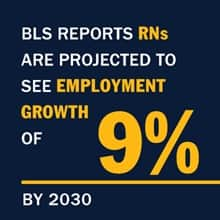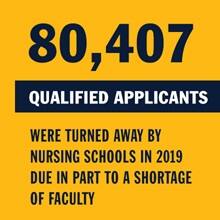What Kind of Education Do You Need to Become a Nurse?

While information technology may seem obvious that you'll need a nursing education to become a nurse, at that place are few things to know nearly how to proceed. Nursing is a field with many pathways. The required caste level and other qualifications you'll need to break into and advance in the profession depend on your career aspirations.
Fortunately, there is a range of options: from the bedside to the boardroom, hospitals to hospices, schools to specialty niches, and opportunities in between.
Some types of nurses and their required level of education include:
- Surgical Assistant Registered Nurse: Associate in nursing (bachelor'due south in nursing preferred)
- Critical Intendance Registered Nurse: Bachelor's in nursing
- Nurse Case Manager: Bachelor's in nursing
- Clinical Nurse Specialist: Main's in nursing
- Nurse Practitioner: Primary's in nursing
Whether you accept a certain patient population in mind or you know you lot want to become a nurse practitioner, the key to achieving your goals is to place your interests and aspirations and then build on your credentials and experiences along the way.
How to Become a Nurse
Most nurses begin with an associate or bachelor's degree in nursing. Some will then earn an avant-garde degree, farther specializing their practice and gaining greater industry expertise.
What Qualifications Do Yous Demand to Go a Nurse?
Regardless of which educational pathway is right for you, you'll need to pass the National Council Licensure Examination, or NCLEX-RN, to get a licensed registered nurse (RN).
Earning this credential is the minimum qualification needed to get a nurse. To sit for the exam, y'all'll need an Associate Degree in Nursing (ADN), nursing diploma or Bachelor of Science in Nursing (BSN).
The platonic path to achieving a nursing degree should marshal with your professional goals while also building on your feel in the healthcare field. With that in mind, let'south await at the unlike nursing degree options bachelor to yous, should you want to go a nurse or abound your nursing career.
And so, What Are the Different Types of Nursing Degrees?
There are several levels of nursing degrees to consider as you map out your career path, from undergraduate options that can help you establish your career to advanced degrees that can get you where yous desire to go.
Associate Degree in Nursing or Nursing Diploma
I educational pathway, and perhaps the first step to becoming a registered nurse is earning an ADN from a two-twelvemonth program at a community higher or vocational school or a diploma from an canonical nursing program.
"While a BSN is the optimal style to go, some second degree or not-traditional students might choose one of these options," said Dr. Peggy Moriarty-Litz, main nursing administrator at Southern New Hampshire University (SNHU).
An ADN or diploma is too an educational stepping stone for licensed practical nurses (LPNs), the wellness services professionals who provide basic nursing care under the direction of RNs. If an LPN aspires to get an RN, this incremental approach "is a neat mode to earn some money while going to school," Moriarty-Litz said. "It also lets LPNs build upon their foundational educational knowledge."
While the nursing profession embraces nurses from all backgrounds and levels, "we encourage them to go along on their education to earn a baccalaureate caste, a chief's degree and even beyond," said Moriarty-Litz.
To this finish, many colleges and universities offering degree programs that build on a student's existing credentials, such as the:
- LPN to BSN
- RN to BSN
- RN to MSN
These bridging degree programs let yous develop your professional person identity as an RN. At the aforementioned fourth dimension, you progress in your career by opening doors to nursing positions in an array of settings, from hospitals and doctor's offices to schools and long-term care facilities.
Bachelor of Science in Nursing
"A baccalaureate education is the preferred route for preparing someone to have the licensure exam in nursing," said Moriarty-Litz. A bachelor's degree in nursing can take about four years to complete and is offered at accredited colleges and universities.
"A nurse prepared at the baccalaureate level is required to take the knowledge, skills and attitudes to deal with the increasing complexity of patient care, which is the outcome of increased life expectancy, a more than diverse patient population and rapid patient turnover in hospital admissions," Moriarty-Litz said.
In addition to the necessary science education, BSN-prepared nurses learn soft skills that are, in fact, vital skills in the profession. According to Moriarty-Litz, these skills include:
- Communication: This means being able to converse conspicuously and effectively with people (patients and colleagues) from diverse backgrounds and cultures.
- Collaboration: Working as part of inter-professional teams, including doctors, pharmacists, medical technicians and caseworkers, has go the standard of nursing and all wellness professions education, according to the National League for Nursing (NLN PDF source).
- Critical thinking: Problem-solving through interpreting, analyzing and evaluating is deemed an essential skill for nurses by an "Acta Informatica Medica" journal commodity.
- Organization: "It'south important for nurses to be organized and methodical in how they approach their responsibilities, especially since many aspects of nursing care are time-sensitive," Moriarty-Litz said.
Finally, hospitals employing larger numbers of BSN-educated nurses are associated with decreased patient bloodshed rates, according to research by Dr. Linda H. Aiken and her co-authors.

In other words, nurses holding a available's degree volition be sought-after in the workforce. Many employers of nurses require or adopt new hires to have a BSN, co-ordinate to a 2021 AACN survey. Sometimes employers will provide registered nurses a specific timeframe to earn the degree.
Acquire more than near what a BSN is and why it pays to advance with one.
Avant-garde Degrees in Nursing
Co-ordinate to the IOM report, nurses with graduate degrees are needed to "assume roles in advanced practice, leadership, teaching and inquiry." The IOM continues:
"While 13% of nurses hold a graduate degree, fewer than 1% have a doctoral degree. Nurses with doctorates are needed to teach hereafter generations of nurses and to bear inquiry that becomes the basis for improvements in nursing science and practice."
Advanced degrees in nursing include:
- Master of Science in Nursing (MSN): Advanced do nurses like nurse practitioners (NPs), clinical nurse specialists (CNSs), certified registered nurse anesthetist (CRNAs) and certified nurse-midwives (CNMs) require an MSN degree and are helping to extend the reach of primary care, according to the AACN. You may elect to narrow your focus within an MSN program – mayhap with an MSN in Healthcare Quality and Safety, Population Health or Nurse Executive Leadership.
- Primary'southward in Nursing Education: For nurses with an bent for teaching or mentoring, a chief's in nursing education lets yous train and educate current and hereafter nurses. While the demand for nursing programs is great, many institutions lack prepared nurse educators, according to Moriarty-Litz. Co-ordinate to the AACN, 80,407 qualified nursing school applicants were turned away in 2019 due in part to a kinesthesia shortage. An advanced degree in nursing didactics can set up you lot to work in educational settings, such as schools of nursing or universities, while clinical educatortracks train yous to piece of work equally a staff educator in long-term intendance or astute care settings. "Nursing education is a broad-open field with needs for instructors in contiguous too as online educational programs," Moriarty-Litz said.
- Dual Degree Programs: These programs let you specialize by combining an MSN with a second advanced degree, such as a Main of Business organisation Assistants (MBA), Master of Public Wellness (MPH), Master of Health Assistants (MHA) and other related master's degrees.
- Dr. of Philosophy (PhD) or Doctor of Nursing Practice (DNP): The former trains scientists and researchers, while the latter targets practitioners. Yet both advance nursing practise, wrote Shaké Ketefian and Richard W. Redman in their journal article examining the programs.
If you want to explore the role a graduate nursing program tin can play in your nursing career, larn more about what an MSN degree is.
Is Nursing Schoolhouse Hard?
Succeeding in a nursing programme takes effort and a bully deal of determination. If yous're already practicing in the field as an RN or working in another career, you may consider attention an online nursing school that tin offer you greater flexibility than you might get on a traditional college campus.

If yous've ever considered the field of nursing, the electric current nursing shortage indicates that now is the time to change that consideration into a solid to-do. A lot of factors, from a changing healthcare system to aging Babe Boomers and many Registered Nurses (RNs) nearing retirement, are contributing to a "critical shortage for nurses" in the U.S., according to the American Nursing Association (ANA).
The shortage means RNs are projected to come across employment growth of 9% by 2030, faster than the average for all occupations, the U.S. Bureau of Labor Statistics (BLS) reports.
How Long is Nursing Schoolhouse?
The length of nursing school depends on the degree you choose. For example, an ADN is typically considered a 2-year degree, while a BSN unremarkably takes four years. Ultimately, the type of degree you demand to become a nurse depends, in role, on the kind of nurse you lot want to be.
The number of terms your school offers each year, coupled with the number of courses you lot can take, can also conform your timeline. If you have any transfer credits from an unencumbered RN license or previous college experiences, you lot may be able to end faster if you nourish a transfer-friendly school.
How Long Does it Take to Become a Registered Nurse?
If you pursue an associate caste in nursing, that'southward typically a two-yr program that prepares you to sit for the NCLEX exam. The timeline all depends on your pacing and the institution in which you begin your nursing instruction.
Some nurses obtain their RN license before moving on to a bachelor'southward degree. If you choose to become an RN first, you tin can beginning practicing in the field while working toward your next credential – pairing your experience with your teaching.
How Many Credit Hours Does it Accept to Become a Nurse?
The programme you are pursuing determines the number of credit hours it takes to earn a nursing degree. If y'all're wondering what a credit hr is, the U.S. Department of Education (DOE) defines information technology every bit one 60 minutes of class time and two hours of educatee training time per week over the course of a semester or quarter.
A BSN at SNHU, for example, is 120 credits, just your unencumbered RN license counts toward 45 of those, and you tin transfer in upwards to 45 more. And so, that would go out just 30 additional credits you would demand to consummate.
Should you wish to earn an MSN, you lot'll notice that many tracks are 36 credits in length – or about 12 courses. Some colleges offering RN-to-MSN programs for those who want to advance their educational timeline.
Whichever nursing path you choose, y'all're positioning yourself to make a difference in healthcare and the lives of others while creating a career with incredible opportunities.
Discover more about SNHU's online RN to BSN Degree: Find out what courses you'll accept, skills you can acquire and how to request information about the program.
Sofia Tokar is a freelance copywriter and editor in higher education. Follow her on Twitter @stokar or connect on LinkedIn.
Source: https://www.snhu.edu/about-us/newsroom/health/what-degree-do-you-need-to-be-a-nurse

0 Response to "What Kind of Education Do You Need to Become a Nurse?"
Post a Comment